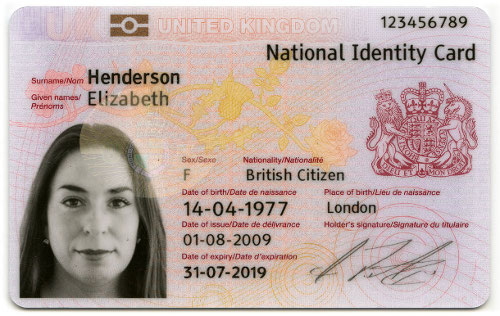New life for fibre broadband and death of ID cards: Tech in the Queen's speech

Scrapping ID cards to save just £86m, while government databases are put on a diet
Scrapping Labour's flagship ID cards scheme will save just £86m, it was revealed today, as the new government unveiled its first draft legislation.
The new Conservative-Liberal Democrat coalition government announced draft bills and its pledges of intent in the Queen's speech to the House of Commons today.
As well as ditching ID cards, the speech contained measures to support the construction of a high-speed broadband network; to end plans to store internet and email records; to change how DNA profiles are stored by the state; and to ditch the ContactPoint child-protection database.
Identity Documents Bill
The Identity Documents Bill will contain the legislation needed to scrap the ID cards scheme for UK citizens. The legislation would both halt the production of the cards and ditch the central National Identity Register database.
However, scrapping the scheme will save just £86m over four years, according to a summary of the bill on the Number 10 website, largely due to the fact that £800m of costs would have been recovered from fees for ID cards.
In March last year, the previous Labour government had said that cancelling the National Identity Scheme would trigger penalty clauses in contracts with the scheme's suppliers, which would cost the government £40m.

The ID card that is issued to UK nationals will be scrapped
(Image credit: Home Office)
The scheme is often referred to as costing £5bn, but that rounded-up figure, for costs from 2009-19, also includes the cost of issuing passports, and that of issuing ID cards to foreign nationals, estimated to cost £309m over the same period.
ID cards are continuing to be issued to foreign nationals staying in the UK, but are now referred to simply as biometric residence permits. This is possible because the details collected from foreign nationals for ID cards are not stored on the National Identity Register but on a separate database overseen by the UK Border Agency.
The Identity Documents Bill requires that the government stops issuing ID cards to British nationals and destroy the data held on the National Identity Register within one month of the bill gaining Royal Assent. The Office of the Identity Commissioner will also be shut down.
UK nationals who have purchased an ID card for £30 will not be getting a refund from the state. Less than 15,000 ID cards have been issued to UK nationals since the cards were made available to them in October last year.
Freedom (Great Repeal) Bill
The Freedom (Great Repeal) Bill will end the indefinite retention of innocent people's DNA profiles on the National DNA Database. It will also restrict the length of time records of email and internet activity can be kept for; further regulate the use of CCTV cameras; and shut down ContactPoint.
The bill will state that police must destroy the DNA records of suspects who have not been convicted of a crime - with the exception of those who faced criminal proceedings for a violent or sexual offence, whose details can be stored for up to five years.
Internet records will not be retained "without good reason" under the bill, a pledge that could spell the end for the proposed Interception Modernisation Programme, which aimed to compel ISPs to hold logs of online activity for access by security services and police.
The bill will also halt plans to introduce second-generation biometric passports from 2012 - passports with an embedded chip containing both a digital photo and scans of the holder's fingerprints.
High-speed broadband
The Queen's speech also stated that the government would support the construction of a fibre optic cable network across the UK that could be used to deliver high-speed broadband, typically capable of 40 - 100Mbps download speeds.
A spokesman for the Department for Culture, Media and Sport said this referred to a review that was being carried out to see whether new legislation was required to force BT to open up its ducts, so that rival telecoms companies could use them to lay new fibre optic networks. The review is also considering whether new laws are needed to compel sewerage companies to open up sewers to telcos for them to lay fibre in.
A statement on the 10 Downing Street website said: "Making it possible for companies wishing to build out new high-speed broadband networks to use the infrastructure that is already in place could significantly reduce costs and drive more commercial investment, including in rural areas where the current market case for investment is less attractive."
Shared services and green tech
The Queen's speech also mentioned that the role of co-operatives will be enhanced by the draft legislation, which echoes an earlier Conservative pledge to help local co-operatives set up joint ventures with the private sector to deliver shared IT services.
Other measures included in the draft bills announced today include previous Tory commitments to publish salaries and expenses of senior civil servants online and to support the creation of a smart electricity grid.